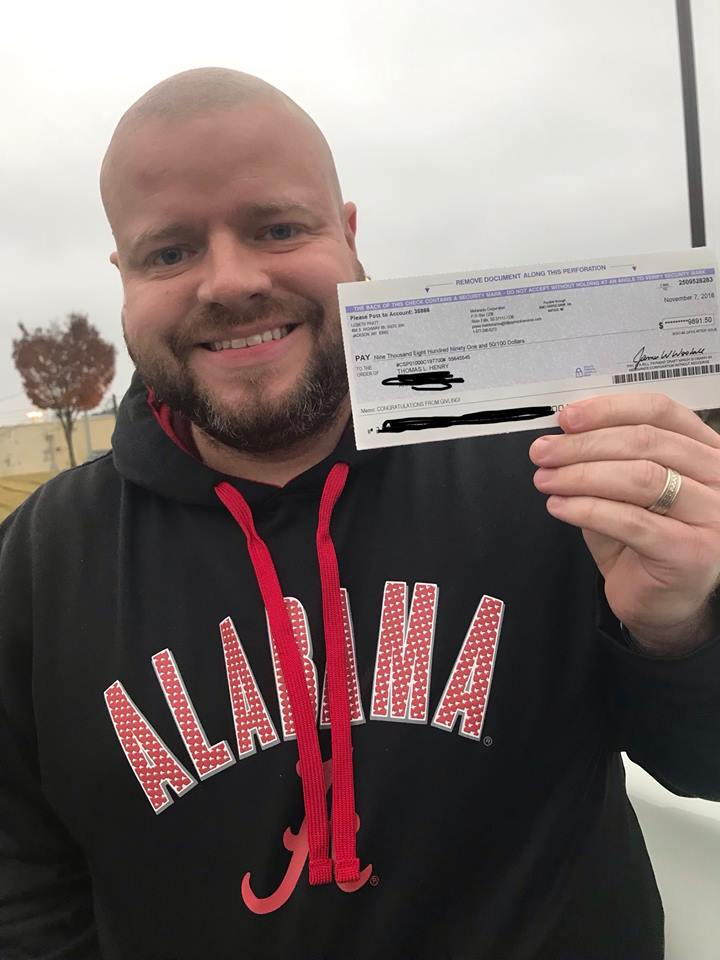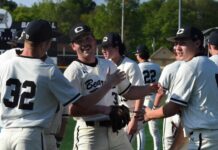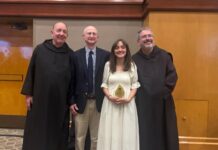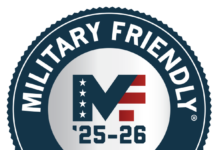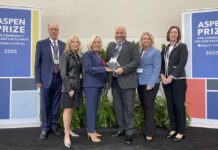Lee Henry holds the $9,891.50 Givling check that made his bank suspicious. (Photo courtesy Lee Henry)
WEST POINT – Lee Henry, who teaches at West Point High School and coaches scholars’ bowl teams for both the high and middle schools, is proving that trivia need not be trivial at all. His high school team has suffered only one regular season defeat since 2012 and has competed at the national level. His current middle school team is undefeated this season all the way through its first post-season tournament last week. Henry, himself a former scholars’ bowl and college quiz bowl competitor, recently won almost $10,000 in an online trivia game (a fact his bank initially viewed with suspicion when he presented them the check) and is on his way to paying off student loans by that means. On top of everything else, he was just named president-elect of the Alabama Scholastic Competition Association, a position he will assume in 2020.
This week, The Tribune talked with Henry to catch up on what has been a busy but highly productive time, and to pick his brain about how to win at quiz games.
Winning on Givling
Henry won $9,891.50 in a contest on Givling, an online trivia competition community that uses crowdfunding to pay out weekly cash prizes and long-term payoffs of student loans and mortgages.
Henry explained, “You can get points watching ads, things like that, and the ad revenue that they get goes toward paying off their members’ loans. And what you do: the more points you get, the more you move up in the line, until you’re the next in line to have your loan paid off. One way they get money is through the ad revenue: you can watch so many ads a day, spin a wheel for however many points. The other revenue source they have is the trivia game.
“They have a weekly prize on that, based on however much money they make that week. They divide it up- part of it goes toward the trivia payout. And when you play a game, it randomly picks two other people who’ve already played, and whatever you score, it adds your score to those two random scores. Part of it is skill and part of it is luck, because even if I go through sometimes and get a perfect score, but if I haven’t been paired with two other good scores, it’s not good enough to get you into the top of the chart for the week. I got really lucky and got paired with some good players and won the trivia payout that was actually- the week ended on Halloween. And it was nearly $10,000.”
Cash winners can’t win more cash for 60 days, but Henry won another contest weeks later. He couldn’t take the money but got instead a nice jump in the student loan payoff line. Starting off over 7,000 back, he’s currently number 113 in line. According to his estimation, he has 20 years left on his student loans but could see them paid off by Givling within the next three years.
Said Henry, “It sounds too good to be true. You know, it sounds a little scammy, but I can testify that it was real and it worked. I got the check and it cleared the bank, and so I’m going to keep doing that. It’s a good online community.”
Alabama Scholastic Competition Association
The Alabama Scholastic Competition Association (ASCA) oversees middle and high school scholars’ bowl competitions across the state, as well as collegiate quiz bowls. Henry has been elected president, but because of the structure of the organization, will serve for two years as president-elect, assisting the current president before he takes over.
Said Henry, “Right now, the president is Josh Rutsky. He’s the coach at Hoover High School. Of course, he was president-elect for two years before. So, for the next two years, I’ll be helping him out and learning the ropes of how to run the organization and everything; and then I’ll take over probably in October of 2020, I think.
“Right now, Josh has set up a quiz bowl camp for Alabama to be held this summer, and he’s asked me to maybe work at that. We haven’t worked out the details, but I’m going to try to work at that.
“I’ve been a board member for the last several years, but never an officer before. We have two or three board meetings a year, where we talk about changes that might need to be made in the format of the game, rules changes, eligibility, things like that. And, you know, we debate and hash out things, and we don’t always agree, but we always do what we think’s in the best interests of our students in the state, and then making scholars’ bowl, quiz bowl better in Alabama.
“I’m excited about it, because I never really–I started playing in seventh grade, because that was as early as you could start back then. And I’ve been involved in some capacity or another with ASCA as a player, a coach, a board member and now an officer, for over 25 years. It was 1993 when I started playing. It just means a lot to me to have that, and seeing it being handed down to people who were actually players.”
Henry noted that active participation in scholastic bowl competition has diminished in recent years, a trend he hopes to help change as an ASCA officer.
“That’s one of the things that I’m going to be working on, is outreach toward teams- especially teams that used to play, that don’t anymore,” he said. “I want to reach out to those teams and find out why they don’t anymore and see if we can get them going again.
“I also applied for a grant to cover the cost of entry into ASCA for all of the Cullman County schools, and actually got awarded that grant. So all of the county schools . . . are going to have their ASCA fees covered for this year.”
Schools that join ASCA and field scholars’ bowl teams qualify for a special stipend, but many coaches lacked the up-front funds to get their membership. Henry hopes that the grant will enable all middle and high schools in the county system to compete.
What does scholastic competition do for students?
Henry answered, “It’s definitely a confidence thing. And you get what you put in. You know, there’re some students who do it as an extracurricular thing to pad a resume- and that’s fine and everything- but then there’re students like me and a lot of the students I’ve coached that- this is their thing. You know, they take it just as seriously as any athlete takes their sport, and they want to be the best at it. And for those students who put in that effort, there’s a confidence boost.”
Henry was a straight-A student through high school, an achievement he attributed largely to the knowledge and confidence he gained as a middle school scholars’ bowl competitor. Competition even won him scholarships to community college and Athens State University. He did not have to take out his first student loan until he reached graduate school.
“Students, they seem to know what’s going on more,” Henry continued. “You know, you watch the news and you hear something’s happened in this country that a lot of people have never heard of. They actually know–‘Oh, I’ve heard of that. I know where that is. I know what’s going on.’ Just a little more cultural awareness and what we call cultural literacy.
“I get the references in TV shows that other people don’t get, and things like that. And then also, I can win trivia and win $10,000! So my wife was like, ‘Well, all that useless information might not be so useless after all!’ I was like, ‘I’ve been telling you for years!’”
What’s the secret to scholars’ bowl success?
Henry plays his coach’s cards close to the vest, guarding much of his wildly successful approach to scholastic competition as a proprietary formula.
“I’ve been doing this a long time,” said Henry, “and I think that’s the main component, is that I played. I know what it’s like to sit there with the buzzer in your hand, the other team staring you down; I know what that feels like, and I know what I would need said to me to get through that and to coach through that.
“You know, I have some tricks. I’ve got some methods I’ve developed over the years, and I’m willing to share some of those, but not all of them . . . It comes from just having so much experience with it. I’ve been involved with it for 25 years now, and I just know what they’re going to ask, because I used to run a question company; I used to write questions for a living. So I know that ‘This is what you need to know about this book. These are the characters you need to know. These are the plot points you need to know.’
“And there’s certain, like, non-negotiables. I have to have somebody on the team who knows the capital of every country in the world. I have to, because they’re going to ask them. I’m working on that with those middle schoolers right now. I don’t have one of those yet, but they’re working on it. And, realistically, there’s 196 countries in the world, and that sounds like a lot. But you make some flash cards and you drill, and you can learn that in two or three days. It’s just a matter of if you have somebody willing to do it. And somehow, I’ve been good at motivating kids to be willing to do those things. I don’t know why, but somehow, I’ve been able to do that.
“A lot of my kids who I’ve coached over the last 20 years have gone on to play in college and been MVPs, and some of them are even coaching now. So it’s been very rewarding to me to have those experiences.
“As far as what’s the key to success, it’s just experience. It’s having kids willing to buy into the program. That’s the biggest thing. Some kids never buy in. Some brilliant kids come in and realize it’s not for them, and that’s absolutely fine. It’s not for everybody. But you have to have a core group of kids who say, ‘This is my thing. Football’s got their kids and basketball’s got their kids, and track and math team, but this is my thing.’
“And there’s always going to be a little group of kids that, this isn’t something casual they do just for fun or just to pad their resumes, but something they’re going to take serious and they’re going to dig in. And when you have those kids, and you have somebody guiding them who has years of experience, you can be successful.”
Copyright 2018 Humble Roots, LLC. All Rights Reserved.

